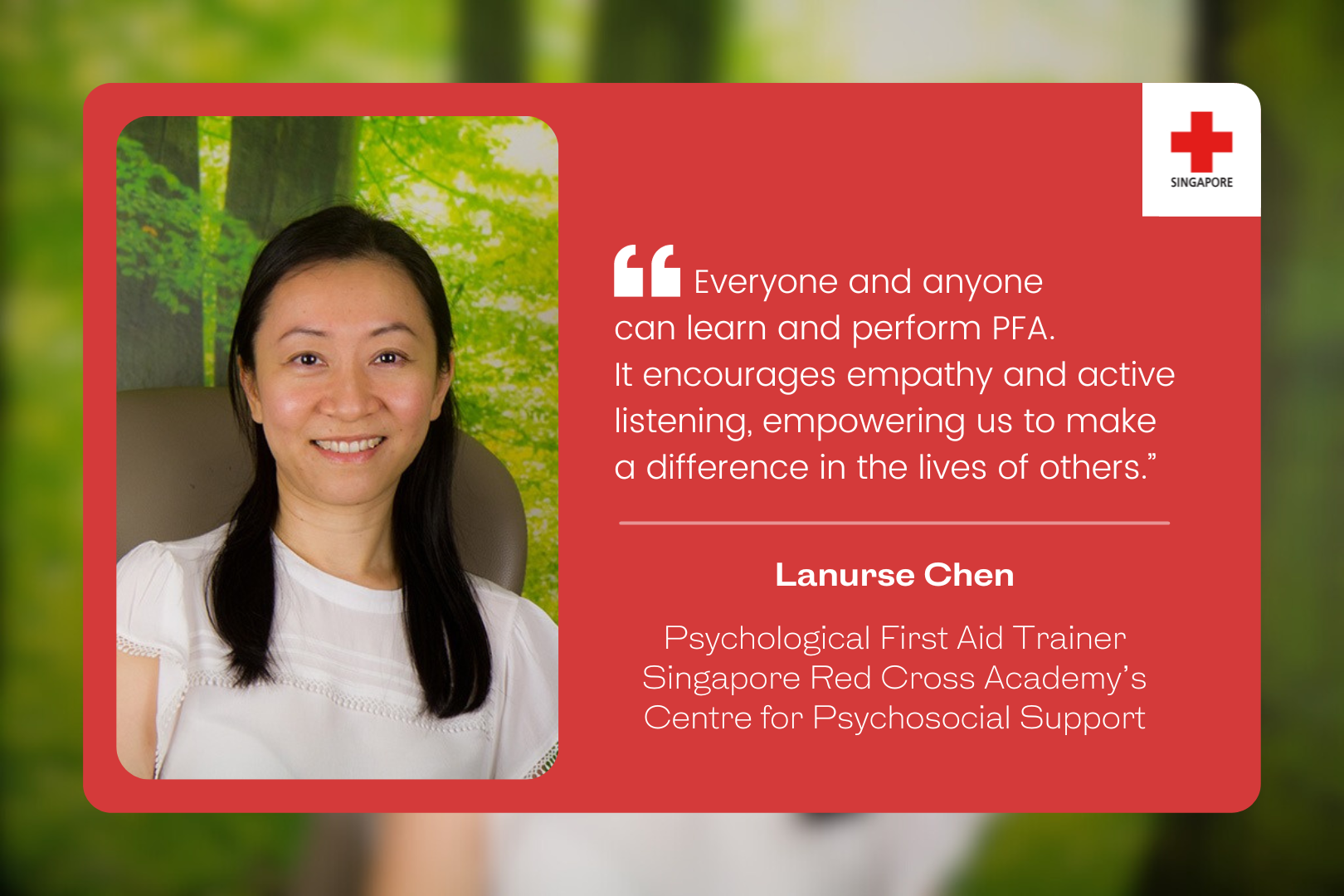
Ms Lanurse Chen, 43, Trainer of Singapore Red Cross Academy's Centre for Psychosocial Support shares how Psychological First Aid (PFA) can positively impact the lives of people around us. PFA can help individuals undergoing emotional distress and trauma, in situations such as accidents and chronic illnesses, violence and assault, loss of a loved one or relationship, retrenchment, personal crises or any other emotional upheavals. PFA also reminds us that self-care is indispensable. Stronger mental health awareness and PFA training can be applied to help alleviate emotional distress and enhance the person's overall well-being. This paves the way for healthier mental states and better quality of life.
1. In what way is PFA important in our lives?
PFA is vital as it enables us to respond effectively to crises and stressful situations by providing immediate emotional and psychological support to people in distress.
PFA enhances resilience and mental health awareness by curtailing the escalation of emotional distress, ultimately contributing to people’s overall well-being. This paves the way for healthier mental states and a better quality of life.
2. How can we use what we learn in PFA for self-care? What are some of the ways we can practise self-care in our lives?
PFA teaches us how to identify distress signs in others and attend to their immediate needs. We can apply the same knowledge to help ourselves when practising self-care. Am I displaying any signs of distress? What immediate needs can I attend to to help myself feel better? It is important to dispel the stigma associated with seeking help. People who have experienced and triumphed through adversity can share their experiences with others. This enhances mental resilience in the community.
Most of the time, we practise self-care by eating healthily, sleeping well, exercising, and engaging in enjoyable activities. However, we can take better care of ourselves by setting boundaries, knowing how to say no when necessary, being kind to ourselves through self-compassion, and giving ourselves breaks when our bodies and minds need them.
3. In what life circumstances would a person require PFA? How can we identify people in need of PFA?
PFA can be beneficial when a person experiences distress, trauma, or emotional upheaval. For example, accidents and injuries, violence or assault, loss of a loved one or relationship, medical emergencies and illnesses, or personal crises.
Observations, empathy, and sensitivity to signs of distress are integral. We can identify people requiring PFA through observation, paying attention to any abrupt or discernable emotional and behavioural changes. If we notice changes, the most effective way will be to ask them if they are all right and listen actively to any expression of distress or mention of experiencing a traumatic event, loss, or crisis.
4. How can PFA help us and help the people whom we interact with or people who go through some challenges in life?
By leveraging PFA techniques, we can offer a listening ear, provide emotional support, and help people feel validated while providing emotional relief. Besides alleviating and managing the immediate emotional distress, focusing on problem-solving empowers people to take on an active role in problem-solving. They can regain their sense of control over their situation.
5. In what way can PFA help our society, in one's family, school, community, and workplace?
Through PFA, we can advocate mental health awareness and dispel the stigma around seeking help for mental health issues. When more individuals are equipped with coping skills and resilience-building techniques, they can help stave off the escalation of trauma and promote recovery from challenging situations, whether at home, school, or the workplace. This strengthens social connections, fosters a sense of belonging and social cohesion, and enhances community resilience.
6. Were there any instances where you provided PFA to someone in need or heard about someone providing PFA to someone in need? Could you share that experience?
The pandemic was challenging for healthcare workers, particularly those with young children. Healthcare workers rely heavily on childcare services to care for their children so they can focus on their jobs with peace of mind. At the height of the COVID-19 pandemic, schools were closed. My friend was highly distressed as she and her husband were healthcare workers. They could not take leave to care for their children at home. Apart from providing her with emotional support, I explored with her the exceptions for children of essential workers. My friend contacted the school and explained her situation. Subsequently, provisions were made for her children to go to school during school hours where they were cared for by the teachers.
7. What would you say to encourage more people to learn PFA?
Everyone and anyone can learn and perform PFA. PFA encourages empathy and active listening. These invaluable skills empower us to make a difference in the lives of others going through a challenging time. This enables them to cope, recover, and thrive.
|
Ms Lanurse Chen is a Counselling Psychologist who practised as a Senior Psychologist in a hospital for more than a decade. She has garnered experience working with young adults to the elderly who face anxiety due to sudden chronic diseases or physical illness, depression, grief and loss, and pain. She is passionate about attending to patients who have met with accidents or trauma, to mitigate the risk of patients developing post-traumatic stress disorder.
|

